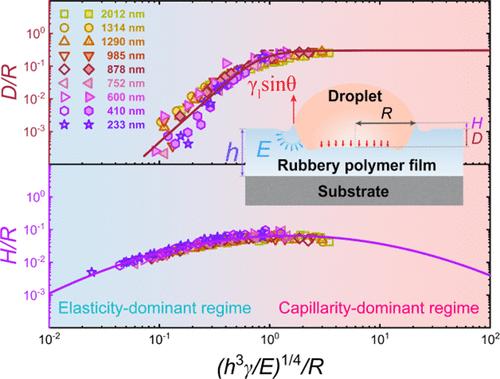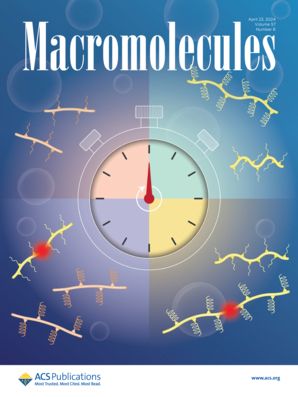Wetting-Induced Elastocapillary Deformation of Supported Thin Rubbery Polymer Films
IF 5.1
1区 化学
Q1 POLYMER SCIENCE
引用次数: 0
Abstract
Whereas classical surface chemistry holds that capillarity controls fluid behavior, recent investigations indicate that it also dominates the mechanics of soft solids at scales below the elastocapillary length (le), which is the ratio of surface tension γ of liquid to elastic modulus E of the solid. We used atomic force microscopy to probe elastocapillary deformations induced by droplets of various radii (R) on partially wetting rubbery films of entangled polymers possessing thicknesses down to 230 nm. The transition from elasticity to capillarity dominated deformation with decreasing R values is visualized with high spatial resolution. The elasticity-to-capillarity transition shifted to lower R values, when the film thickness (h) is reduced to a threshold below approximately 10 times of the bulk le (le,bulk) values, indicative of a smaller le on the thin films. This enabled the identification of a thickness-dependent elastocapillary length (le,h) ∼ (h3γ/E)1/4 for soft polymer films on rigid substrates, and, by extension, suggests the scaling le,h ∼ h–n, where n varies with the contrast between the moduli of the films and substrates. The results resolve the foundation of the fluid wetting and interactions with thin, substrate-supported soft films.

湿润诱导的支撑型薄橡胶聚合物薄膜的弹力毛细管变形
经典的表面化学认为毛细管控制着流体行为,而最近的研究表明,在低于弹性毛细管长度(即液体表面张力γ与固体弹性模量E之比)的尺度上,毛细管也主导着软固体的力学。我们使用原子力显微镜探测了不同半径(R)的液滴在厚度低至 230 纳米的缠结聚合物部分润湿橡胶薄膜上引起的弹性毛细管变形。随着 R 值的减小,从弹性变形到毛细管主导变形的转变是以高空间分辨率可视化的。当薄膜厚度(h)减小到低于体积le(le,bulk)值约 10 倍的临界值时,弹性向毛细管的转变就会转向较低的 R 值,这表明薄膜上的le 值较小。这就确定了刚性基底上的软质聚合物薄膜随厚度变化的弹性毛细管长度 (le,h) ∼ (h3γ/E)1/4,并由此推导出比例 le,h ∼ h-n,其中 n 随薄膜和基底的模量对比而变化。这些结果解决了流体润湿以及与基底支撑的软薄膜相互作用的基础问题。
本文章由计算机程序翻译,如有差异,请以英文原文为准。
求助全文
约1分钟内获得全文
求助全文
来源期刊

Macromolecules
工程技术-高分子科学
CiteScore
9.30
自引率
16.40%
发文量
942
审稿时长
2 months
期刊介绍:
Macromolecules publishes original, fundamental, and impactful research on all aspects of polymer science. Topics of interest include synthesis (e.g., controlled polymerizations, polymerization catalysis, post polymerization modification, new monomer structures and polymer architectures, and polymerization mechanisms/kinetics analysis); phase behavior, thermodynamics, dynamic, and ordering/disordering phenomena (e.g., self-assembly, gelation, crystallization, solution/melt/solid-state characteristics); structure and properties (e.g., mechanical and rheological properties, surface/interfacial characteristics, electronic and transport properties); new state of the art characterization (e.g., spectroscopy, scattering, microscopy, rheology), simulation (e.g., Monte Carlo, molecular dynamics, multi-scale/coarse-grained modeling), and theoretical methods. Renewable/sustainable polymers, polymer networks, responsive polymers, electro-, magneto- and opto-active macromolecules, inorganic polymers, charge-transporting polymers (ion-containing, semiconducting, and conducting), nanostructured polymers, and polymer composites are also of interest. Typical papers published in Macromolecules showcase important and innovative concepts, experimental methods/observations, and theoretical/computational approaches that demonstrate a fundamental advance in the understanding of polymers.
 求助内容:
求助内容: 应助结果提醒方式:
应助结果提醒方式:


